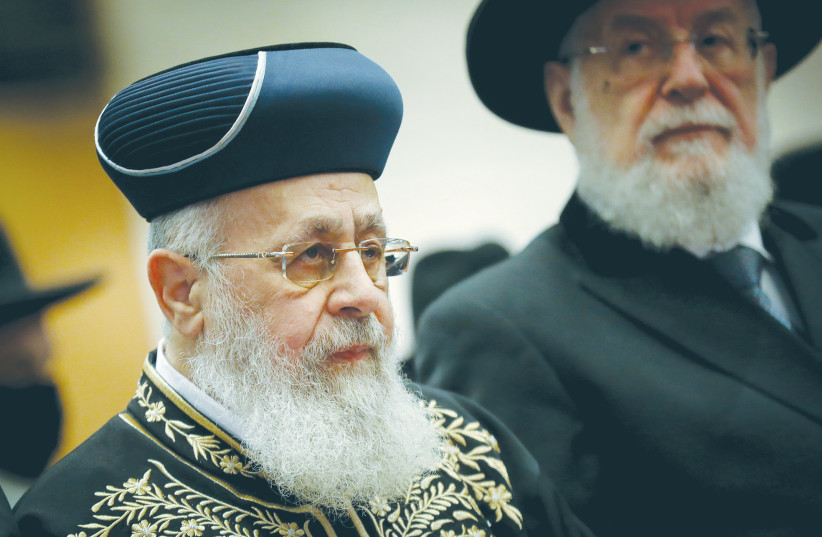Israeli politicians across the spectrum responded on Sunday to a comment by Rabbi Yitzhak Yosef, the Sephardic Chief Rabbi of Israel, that “If they [the authorities] force us to join the army, we will all move abroad.”
In his weekly sermon on Saturday night, Yosef added that “all of those secular people need to understand: Without Torah study, without the yeshivas and kollels [Jewish religious academies for single and married men], the army will not succeed.”
He said that “everyone must say with pride… ‘it is the Torah that protects us.’”
Yosef’s comments came in response to a public storm that began several weeks ago when it became apparent that the IDF intends to prolong mandatory and reserve duty for existing soldiers, but not to draft any of the yeshiva students, who enjoy a blanket exemption.
Opposition leader Yair Lapid lambasted the chief rabbi’s remarks, stating, “Rabbi Yosef’s words are an insult and disgrace to the IDF soldiers who risk their lives to defend the country. Rabbi Yosef is a state employee with a salary from the state; he cannot threaten the state.”

The Sephardic-haredi (ultra-Orthodox) Shas Party defended Yosef: “Take off your shoes before you speak disparagingly toward the chief rabbi, who expressed a clear and resolute opinion about the tremendous right of Torah scholars who defend the land.
“Those who silently encourage the insubordination of organizations opposing judicial reform should not lecture us about morals,” the party said.
Lapid later responded, criticizing the party for redirecting the topic to judicial reform.
“There’s no such thing as ‘silent encouragement.’ I oppose insubordination, I oppose evasion, I oppose the threats of leaving the land,” the opposition leader declared. “Can we return to the main point? The main point is that if 66,000 Haredi youths enlist, the IDF will receive 105 new battalions that are essential for Israel’s security.”
"We will never abandon our land"
In a post to X on Saturday night, Minister Benny Gantz, chairman of National Unity, joined Lapid.
“After 2,000 years of exile, we returned to our land. We will fight for it and never abandon it. Rabbi Yosef’s words are a moral affront to the State and Israeli society,” Gantz said. “Everyone should take part in the sacred right to serve and fight for our state, especially in this difficult time – even our haredi brothers.”
Lithuanian-haredi party Degel Hatorah defended Yosef.
“Rabbi Yitzhak Yosef is right. God forbid, there is no right to exist as a people, in the Land of Israel, without Torah students, for whom Torah is their vocation,” the party said in a statement.
“This is the Torah, and these are its students – that lifted us up during thousands of years of Diaspora and much suffering, and thank God we survived and returned to our land.”
The contrasting statements sharpened the deep ideological differences between the haredi and other parties – including the national religious ones – and highlighted the complexity of drafting at least part of them into the IDF.
Two secular opposition parties, Yisrael Beytenu and Labor, sharply criticized Yosef. The two parties affiliated with religious Zionism – the Religious Zionist Party and Otzma Yehudit – also did, albeit with a softer tongue.
For example, RZP said “Conscripting into the army is a great mitzvah! After two thousand years of exile, we will never leave our country. A public that is willing to pay with its life for the Land of Israel will not give it up under any conditions.”
The Likud did not respond; neither did its leader, Prime Minister Benjamin Netanyahu. However, several Likud ministers voiced criticism, including Diaspora Affairs and Combating Antisemitism Minister Amichai Chikli and Education Minister Yoav Kisch.
In a poll published by the Israel Democracy Institute on Sunday, some 70% of Jewish respondents thought that changes should be made to the exemption given to haredim. Among haredi respondents, only 19% said that their exemption should be changed versus 68.5% who, predictably, said it should not.
The public debate over haredi exemption from IDF service broke out after the government last month announced its plan to extend mandatory and reserve duties for current soldiers to fill the ranks left vacant by the many soldiers killed and injured in action, as well as to meet Israel’s heightened security needs. The government did not propose to meet these needs by recruiting soldiers from a broader pool of candidates, such as haredim, to lessen the burden on those who are already serving.
This debate also coincided with a case against the haredi exemption that is currently underway in Israel’s Supreme Court. The previous law that enabled haredi exemption officially expired at the end of June 2023, and the government decided that it would pass a new law by the end of March 2024.
But with that date fast approaching, the government does not seem close to solving the issue. Government funding for yeshiva students also stems from the law that expired, and thus if no solution is found by the end of March, haredi men may no longer be legally entitled to an exemption, and yeshivot may lose their funding.
Yaki Adamker contributed to this report.
